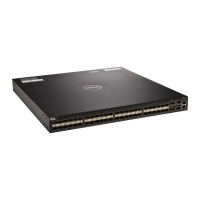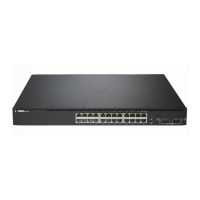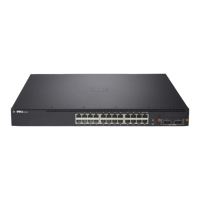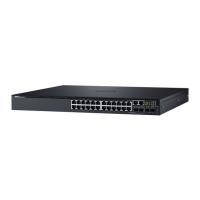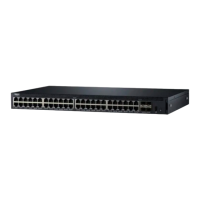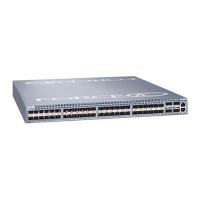Configuring L2 Multicast Features 705
What Is IGMP Snooping?
IGMP snooping allows the switch to snoop on IGMP exchanges between
hosts and multicast routers. The IGMP snooping feature complies with RFC
4541. When a switch “sees” an IGMP report from a host for a given multicast
address, the switch adds the host's interface/VLAN to the L2 multicast group
forwarding table and floods the report to all ports in the VLAN. When the
switch sees a leave message for the group, it removes the host interface/VLAN
from the L2 multicast group forwarding table.
IGMP snooping learns about multicast routers by listening for the following
messages:
• IGMP Membership queries
•PIMv1 hellos
•PIMv2 hellos
• DVMRP probes
Group addresses that fall into the range 224.0.0.x are never pruned by IGMP
snooping—they are always flooded to all ports in the VLAN. Note that this
flooding is based on the IP address, not the corresponding 01-00-5e-00-00-xx
MAC address.
When a multicast router is discovered, its interface is added to the interface
distribution list for all multicast groups in the VLAN. If a switch is connected
to a multicast source and no client, the switch filters the traffic from that
group to all interfaces in the VLAN. If the switch sees an IGMP join from a
host in the same VLAN, then it forwards the traffic to the host. Likewise, if
the switch sees a multicast router in the VLAN, it forwards the group to the
multicast router and does not flood in the VLAN. There is a user option to
cause the switch to flood multicast sources in the VLAN if no multicast
clients are present.
By default, multicast routers are aged out every five minutes. The user can
control whether or not multicast routers age out. If all multicast routers age
out, the switch floods the VLAN with the multicast group.
Multicast routers send an IGMP query every 60 seconds. This query is
intercepted by the switch and forwarded to all ports in the VLAN. All hosts
that are members of the group answer that query. The switch intercepts the
replies and forwards only one report per group from all of the received
responses.
